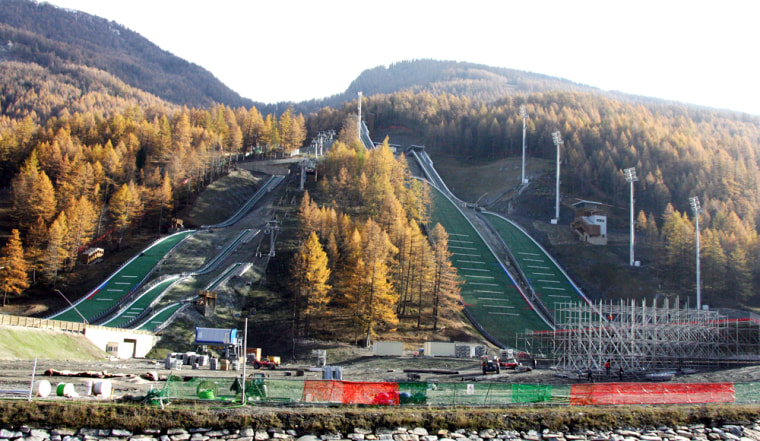Two scars on the hillside facing their sleepy Alpine village will remind locals of 16 days of Olympic fame for years to come.
In the words of one environmental activist, Pragelato has been “buried under an avalanche of cement” during construction of the two ski jumping hills for next February’s Winter Games.
The villagers, however, do not seem to mind.
In a hamlet where the only sound on a Friday night is the ringing of cowbells, any change is welcome.
“It’s very boring, to tell you the truth,” said 17-year-old Erica Sproccati, waiting for one of the few buses connecting Pragelato to the nearest city, Turin.
“We’re few residents and few tourists. I think it’s good we have the ski jumps, it will bring some people,” she added.
Two perspectives
Environmentalists in Turin, host of the 2006 Games, say the event will harm wildlife and forests and pollute the air and water.
Up in the northern Italian mountains, the view is different.
Hotel owners are happy because they are fully booked for the the Games, which run from Feb. 10-26, and are also hosting dozens of builders working on the various construction sites.
Shopkeepers expect Olympic visitors to buy plenty of their farmhouse cheeses, homemade jam and sausages, and to come back for more after the Games.
“As for the trees that have been chopped down -- there are still trees to the right, there are trees to the left,” said Maria Viggiani, closing up her bread and cheese shop for the day as darkness crept up the valley.
Several controversies
Green activists see Pragelato’s two ski jumping hills as a symbol of Olympic folly -- a venue built from scratch, in all likelihood left to crumble once the event is over, like so many stadiums and speed tracks around the world.
Wanda Bonardo of environmental group Legambiente in Turin rattled off a list of projects that enraged her: The 1,400-meter bobsled track, which required hundreds of trees to be cut down; Olympic villages built on pristine mountainsides; the torrents of water that will be used to produce artificial snow; and, of course, the ski jumping hills.
Ski resorts in general are unpopular with environmentalists. Every spring, the snowy slopes turn into barren strips of earth and gravel. Global warming is now forcing skiers to move higher up the mountains in search of snow, damaging untouched habitats.
“Some of these sports are only practiced by very few people,” Bonardo said. “The bobsled track is monstrously damaging. One option would be to eliminate such sports from the Olympic Games.”
Removable venues?
Bonardo and other activists such as Fabio Porcari at the World Wildlife Fund in Turin asked the Games organizers TOROC to make removable venues instead.
TOROC refused, arguing that pack-away facilities would fail Olympic safety and technology standards.
Still, the organizing committee recognizes that there is a problem.
“The environmental damage is there. What you can do is intervene to limit the damage,” said Roberto Saini, environmental director at TOROC.
Turin has pledged to stage “green” Olympics, for example by offsetting additional energy consumption during the Games against power savings in schools and government offices.
It is also trying to compensate for the trees it has chopped down for venues by planting the same number on other hillsides and will transport tons of the additional sewage produced by athletes and spectators to urban treatment centers to take the pressure off small mountain facilities.
Climate neutral claim
organizers said the Games would be the most environmentally friendly Olympics ever and would have no net impact on climate change.
“This is the first time that an Olympic event will be able to offset all the carbon emissions produced during the event,” Ugo Pretato, TOROC’s head of environmental programs, said in a statement.
Environmentalists appreciate the effort but they want something more radical -- either abolishing the Winter Olympics or recycling previous sites instead of opening up new mountainside sites every four years.
Saini partly agrees.
“I think the Olympics should continue to take place but maybe use existing venues,” he said. “For example, the Alps are not so vast -- if the Olympics were held in Switzerland, they could easily use venues in Italy.”
